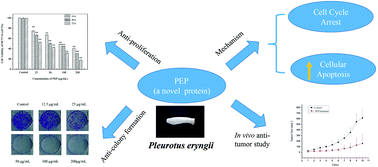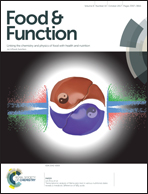In vitro and in vivo inhibitory effects of a Pleurotus eryngii protein on colon cancer cells
Abstract
Edible mushrooms have been considered as a good source of bioactive components with various health benefits. Our previous study demonstrated the identity of a novel protein from Pleurotus eryngii, namely PEP, and its anti-inflammatory activities. Herein, we further determined the inhibitory effects of PEP against colon cancer cells. PEP suppressed the proliferation of human and murine colon cancer HCT116 and MC38 cells in a dose and time-dependent fashion, while it showed no inhibitory effect on normal human colonic myofibroblasts CCD-18Co at the same concentrations tested. Moreover, PEP induced cell cycle arrest and led to extensive cellular apoptosis in colon cancer cells, which was associated with the downregulation of cell cycle-related signaling proteins, e.g. cyclin B, cyclin E and cdc-2, and the upregulation of apoptosis-related signaling proteins, e.g. p53 and c-PARP. The results from an in vivo study showed that PEP treatment significantly suppressed tumor development of allograft colon cancer cells in mice, and this inhibition was associated with the upregulation of p21, p53, caspase-3 and cleaved caspase-3. Overall, our results provided a basis for PEP as a promising preventive agent against colon cancer.



 Please wait while we load your content...
Please wait while we load your content...